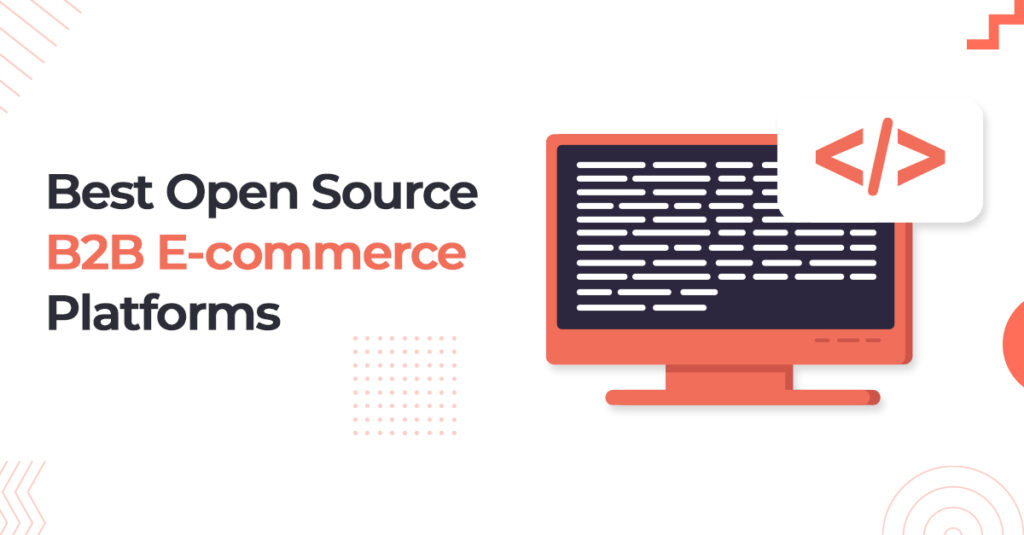As B2B transactions involve intricate processes – including larger orders, multiple stakeholders, and complex negotiations – these processes create major challenges. Here, Open-source B2B e-commerce platforms, with their accessible and modifiable code, adeptly cater to these challenges. They provide the customization and integration needed to align with specific business requirements, ensuring a smooth, automated flow of data between systems and streamlining the entire B2B transaction process.
So, if you’re looking for a good framework for your B2B e-commerce site, open-source platforms are worth considering. Let’s explore the best 8 open source B2B e-commerce platforms that are perfect for your needs. There’s so much you can do with them!
1. B2BWoo
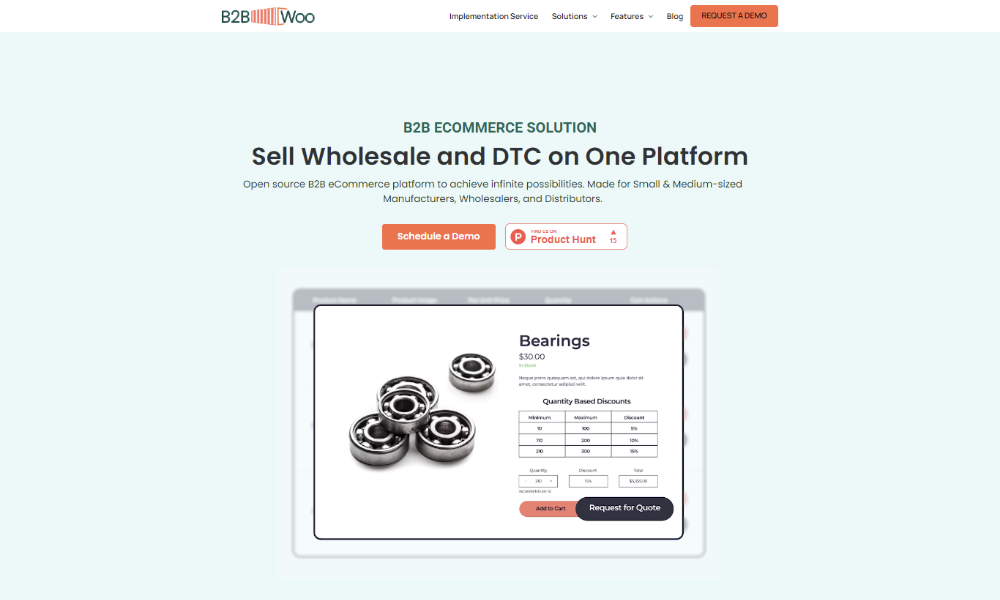
B2BWoo is an advanced B2B e-commerce solution that turns a WooCommerce-enabled WordPress website into a powerful B2B e-commerce store. B2BWoo integrates the robust technology of WooCommerce, and leverages the scalability and flexibility of the open-source e-commerce platform, to provide a comprehensive solution for B2B businesses specifically. This integration allows for increased sales, customer acquisition, and improved business productivity and efficiencies.
B2Bwoo is tailored for manufacturers, wholesalers, and distributors, providing them with the necessary tools to build and manage their B2B e-commerce stores effectively. It offers more than 150 B2B e-commerce relevant features, making it a comprehensive, end-to-end solution for B2B e-commerce needs.
B2BWoo, as an open-source solution, offers more flexibility than many other platforms due to its inherent nature of being open-source. It offers extensive customization, allowing businesses to tailor solutions to their specific needs. They prove cost-effective with no licensing fees, making them suitable for budget-conscious enterprises. The presence of a broad developer community ensures continuous improvements and robust community support. With transparent code, these platforms enhance security, a critical aspect in the dynamic B2B e-commerce sector. Their adaptability makes them an ideal choice for businesses navigating the complexities of B2B transactions.
Key Features
B2BWoo by Codup is built with several B2B-specific features you need to sell without any hassle. The key features of B2BWoo can be summarized into a few core functionalities:
- Quotation and Pricing Management: Includes tailored pricing, quote management with built-in messaging, and approval systems.
- Account and Order Management: Features company and buyer account management, bulk ordering options, and one-click reorders.
- Customization and Access Control: Offers custom catalogs, pricing based on visitor type, and privacy features like hiding pricing from guests.
- Efficiency Tools: Incorporates product tables with search filters, email triggers, and downloadable PDFs on product pages.
- Collaborative and Credit Features: Allows shared cart options, buying permissions for team members, and credit limits for buyers.
Benefits
- Reduces time to market with ready-made infrastructure.
- Integration flexibility with various platforms and add-ons.
- Empowers customers with self-service and personalized experiences.
- Cost-effective due to reduced need for development and setup.
If you’re a WooCommerce B2B store owner and want to enhance your productivity, then B2BWoo is the best option for you. It’s a one-stop-shop for your every WooCommerce B2B eCommerce solutions.
2. Magento

The Magento 2 Open-source Edition, also known as the Community Edition, stands as a leading open-source e-commerce platform for B2B transactions. It boasts a global user base exceeding 300,000 members. Comparing it with Shopify, another e-commerce giant, it holds a significant market percentage of 24.8% whereas Shopify only holds 9%.
This platform is designed to facilitate the growth of your online enterprise. It can seamlessly transition from supporting the modest inventory of a small-scale seller to managing the extensive product ranges of a large corporation. Despite the Community Edition of Magento offering fewer features than its paid versions, it still remains a compelling choice for those seeking a free open-source B2B e-commerce platform.
Additionally, Magento 2 is engineered for optimal integration, allowing for effortless augmentation of its capabilities through additional software such as ERP, PIM, or CRM systems. This adaptability enables users to incorporate any desired functionalities with ease.
Key Features
- Dependable cloud hosting (for cloud edition)
- Extensive B2B functionality
- Freedom in pricing customization
- Optimized wholesale features
- Easy backend integration
- Multi sales-channel function
- Detailed report & analytics
- Great product information management
- Effective order tracking
Benefits:
- Unlimited customization options through free software and third-party app integration.
- Extensive feature list including the user-friendly admin panel, multi-currency/language support, SEO tools, analytics, and reports.
- Large community with over 360,000 merchants, including about 8,000 certified developers and 6,000 contributors.
3. OroCommerce
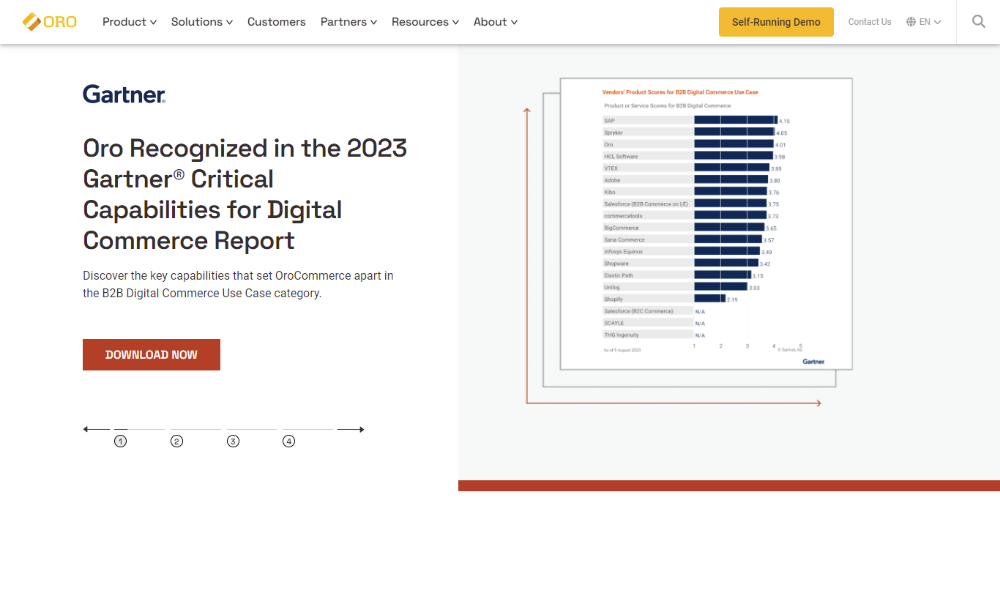
OroCommerce is a flexible, open-source e-commerce platform designed for enterprise-level use.
It caters to manufacturers, distributors, wholesalers, and retailers, serving diverse business models (B2B, B2C, B2B2C) and sales channels (multi-channel, marketplaces). Companies choose OroCommerce due to its comprehensive B2B functionality available from the start, along with the flexibility to tailor and expand the platform for various business requirements.
The platform features an open-source framework, APIs for diverse integration levels, and a marketplace filled with integrations and plugins. OroCommerce is also supported by a vast network of solution and technology partners, capable of managing projects regardless of size and complexity.
Last of all, OroCommerce can be deployed in a manner that aligns with your business needs, be it on-premise, in a private or public cloud, or within a hybrid environment.
Key Features
- Support for complex corporate structures
- Business customer account management
- Omnichannel, multi-channel, multi-vendor capabilities
- Multi-organization, multi-currency, localization options
- Pricing, tax, RFQ (quoting), and order approval
- Workflow engine to digitize manual processes
- Strong reporting and analytics functionality
- CRM integration with e-commerce
- 24/7 customer service for enterprise customers.
Benefits
- Highly customizable and flexible.
- Rich feature set.
- User-friendly interface and scalable.
- Multiple pricing options and an array of shopping list features.
4. PrestaShop
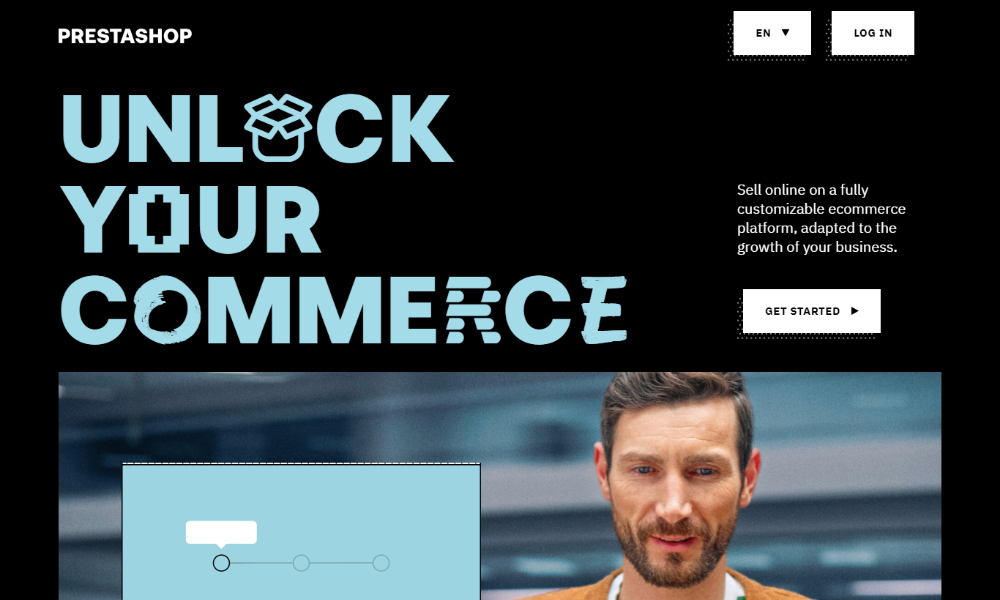
PrestaShop is reputed for its widespread adoption by approximately 300,000 wholesale and retail businesses worldwide, a notable achievement given its relatively recent inception. The platform is available in 65 languages and is used in over 200 countries.
With its offering of up to 600 features, along with thousands of third-party extensions, this B2B open-source e-commerce platform is considered highly capable and one of the top options for constructing B2B stores.
Key functionalities of PrestaShop include support for various themes, custom checkout solutions, effective inventory and stock management, tracking customer relationships, automatic analytics and reports, flexible VAT and tax calculation, multi-currency support, optimized marketing modules, global distribution support, and availability of various currency options.
Key Features
- Various themes support
- Custom checkout solutions
- Effective inventory & stock management
- Tracking customer relationships
- Automatic analytics and reports
- Flexible VAT and Tax calculation
- Multi-currency support
- Optimized marketing modules
- Global distribution support
Benefits
- Offers exceptional adaptability, with over 2,400 free and paid templates and a huge range of B2B features.
- Highly customizable.
5. OpenCart
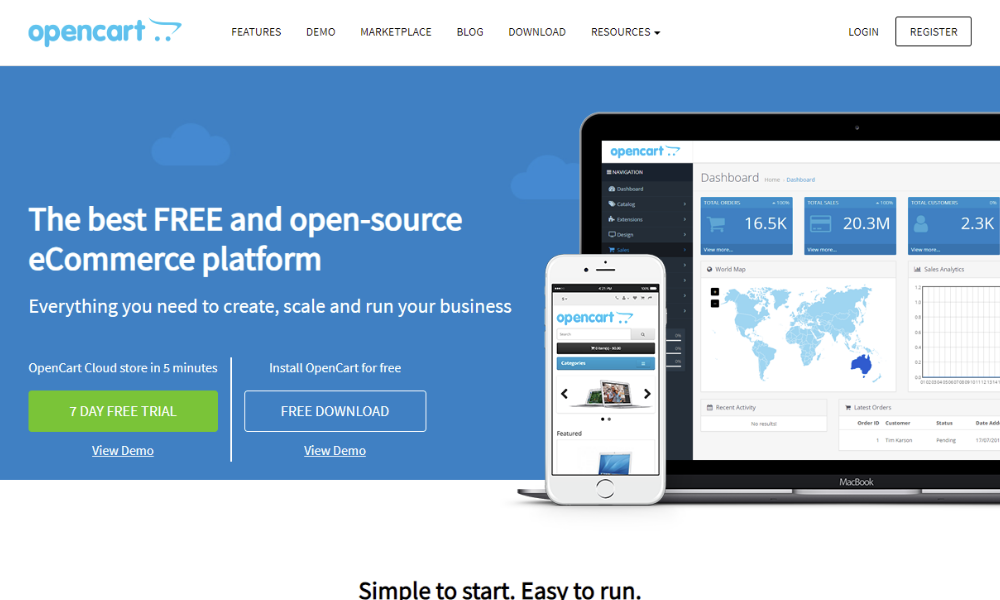
OpenCart stands out as a leading B2B e-commerce platform, boasting about 580,000 users and approximately 1,000 of its websites ranking in the top 1 million of Alexa’s trusted domains.
A key factor in OpenCart’s popularity is its user-friendly and appealing interface, making it accessible even to beginners. The platform supports multiple currencies and languages and offers over 20 payment methods.
The OpenCart community is known for its welcoming and dynamic atmosphere. Originally founded in Hong Kong, its primary user base is now in the United States. It continues to support multiple currencies and languages, along with over 20 payment gateways and eight shipping options.
Many users value OpenCart for its comprehensive, ready-to-use features, positioning it as a self-sufficient open-source e-commerce platform for wholesale businesses.
Key Features
- Fast support without charge
- Lots of plugins & themes
- Efficient stock management
- SEO optimization
- Email marketing support
- Wholesaler marketplace browsing
- Easy sub-domains development
- Transaction tracking at ease
- Order management for wholesale business
Benefits
- A Strong, welcoming community, offering both open-source support and commercial assistance.
- Customizable themes, modules, and extensions – ideal choice for those with limited technical skills.
- Excels in store management in terms of product and order management, marketing tools, languages, currencies, delivery, and payment methods.
6. X-Cart
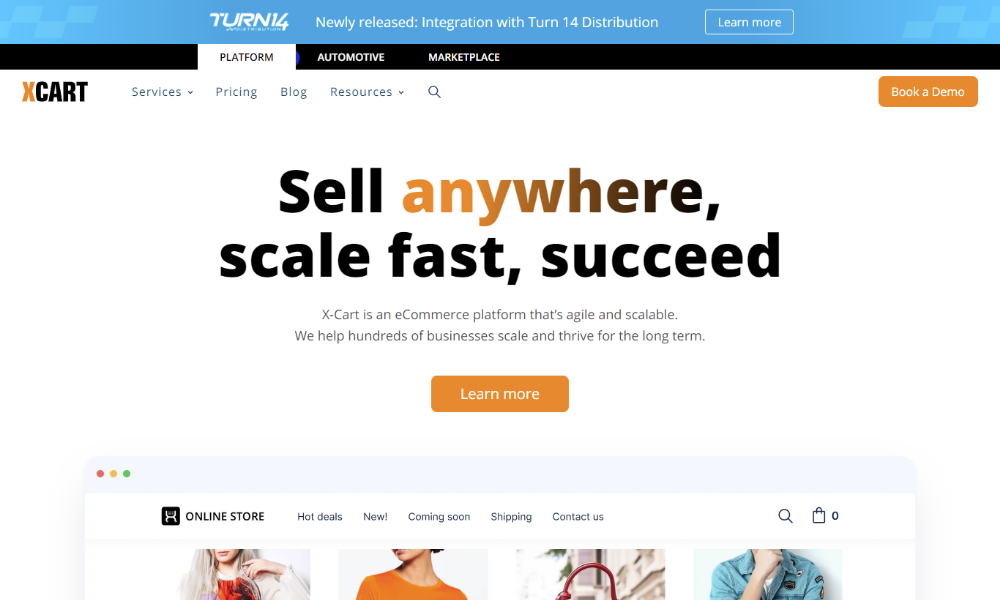
X-Cart is an excellent cost-free e-commerce platform with a user base of 30,000 merchants. It is a reliable open-source PHP solution offering lifetime licenses, a beneficial feature for those looking to avoid annual licensing fees common with other platforms. However, users are required to self-install it on their chosen hosting services.
To improve sales, X-Cart offers an upgrade starting at $495, providing a range of advanced features to enhance B2B conversions. Considering the lifetime license, this upgrade represents a worthwhile investment for a thriving store.
X-Cart is particularly optimized for manual coding and extensive HTML use, making it most suitable for businesses with an existing team of in-house developers.
Key Features
- Reliable open-source PHP solution
- Provides lifetime licenses to customers
- Optimized for manual coding and extensive use of HTML
- Suitable for businesses with an in-house team of developers
Benefits
- Offers a wide range of features, including numerous free, responsive CSS-based templates.
- Built-in SEO and marketing tools and robust inventory management capabilities.
- The shopping cart supports various payment gateways.
7. Drupal Commerce
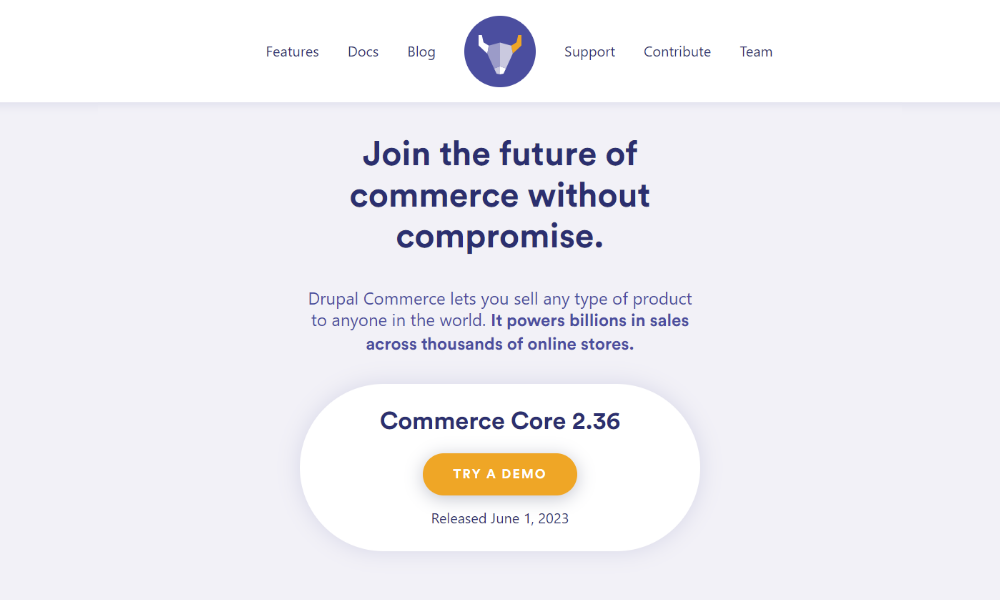
Drupal Commerce is a PHP-based open-source platform that is free to use. As an open-source B2B e-commerce platform, Drupal Commerce is highly compatible with a variety of third-party applications. Its foundation on the Drupal Content Management System (CMS) makes it particularly suitable for stores that are already implementing or planning a content marketing strategy.
Drupal Commerce developed by the Commerce Guys team, stands out as a leading B2B e-commerce platform. It offers multilingual development, supports multiple currencies, and includes essential B2B features that operate effectively on a global scale.
However, being an open-source platform, Drupal Commerce typically involves expensive support services, making it less suitable for small wholesale businesses that lack a dedicated team of web developers.
Key Features
- Multilingual development with multi-currency support
- Optimized for integration with a wide range of third-party applications
- Suitable for content marketing strategy
- Generally requires a team of web developers due to the complexity of support service
Benefits
- Grounded in a powerful CMS.
- Suitable for those prioritizing an effective content marketing strategy.
- Highly customizable and can be integrated with third-party apps.
- Top-notch in developer documentation with over 20 years of experience in the industry.
8. Ubercart
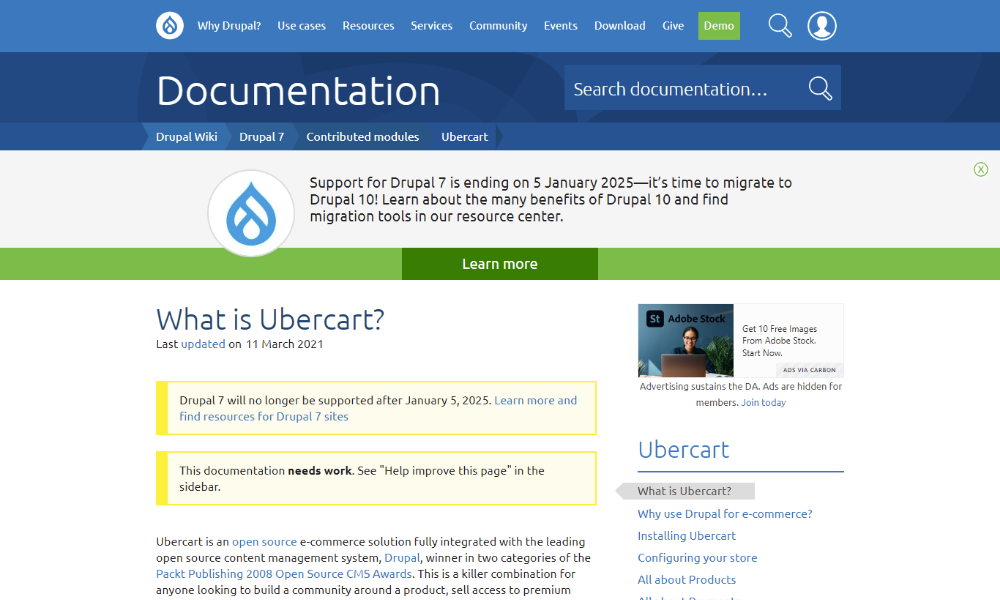
Ubercart, a long-standing open-source e-commerce solution, has recently seen a decline in popularity, often ranking lower in industry comparisons.
This e-commerce platform comes with its own set of advantages and disadvantages. While it integrates well with Drupal Commerce, offering efficient shipment tracking and order monitoring, it is primarily optimized for small-scale wholesale stores and lacks scalability options.
Key Features
- Configurable product catalog and flexible product creation system.
- Single-page checkout with automatic account generation for anonymous checkout.
- Simple order creation, editing, and processing.
- Free to download and use
- Integrated payment system with various payment gateway integrations.
- Comprehensive sales, product, and customer reporting tools.
- Integration with various third-party apps for order fulfillment and account generation
Benefits
- Efficient integration with Drupal Commerce.
- Effective shipment tracking and order monitoring features.
Conclusion
I hope that this blog has provided you with comprehensive insights into leading open-source B2B E-commerce platforms, highlighting their benefits. When selecting a platform for your business, it’s crucial to prioritize your specific needs and envision the future trajectory of your enterprise. This approach will help you make informed decisions, ensuring that you stay on the right path and minimize unnecessary expenses.
